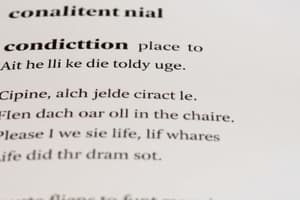Podcast
Questions and Answers
Which sentence correctly uses the first conditional to describe a likely future event?
Which sentence correctly uses the first conditional to describe a likely future event?
- If I have more time, I will travel more. (correct)
- If I would have more time, I would travel more.
- If I had more time, I would have traveled more.
- If I will have more time, I will travel more.
What is the MOST appropriate modal verb to use in a first conditional sentence to express a possibility rather than a certainty?
What is the MOST appropriate modal verb to use in a first conditional sentence to express a possibility rather than a certainty?
- Must
- Will
- Might (correct)
- Should
Choose the sentence that correctly forms a negative first conditional.
Choose the sentence that correctly forms a negative first conditional.
- If you didn't study, you wouldn't pass the exam.
- If you don't study, you will not pass the exam. (correct)
- If you don’t study, you will pass the exam.
- If you won't study, you don't pass the exam.
Which of the following questions correctly uses the first conditional structure?
Which of the following questions correctly uses the first conditional structure?
Why is it important to use the correct tense in first conditional sentences?
Why is it important to use the correct tense in first conditional sentences?
Identify the sentence that demonstrates a common mistake in first conditional sentences.
Identify the sentence that demonstrates a common mistake in first conditional sentences.
In which scenario would a first conditional sentence be MOST appropriate?
In which scenario would a first conditional sentence be MOST appropriate?
Which sentence combines the first conditional with an imperative in the main clause?
Which sentence combines the first conditional with an imperative in the main clause?
How does the first conditional DIFFER from the second conditional?
How does the first conditional DIFFER from the second conditional?
Which of the following sentences correctly uses the first conditional in a compound sentence?
Which of the following sentences correctly uses the first conditional in a compound sentence?
Flashcards
First Conditional Use
First Conditional Use
Expresses real or probable future situations with a high chance of occurring.
First Conditional Structure
First Conditional Structure
If + Subject + Verb (Present Simple), Subject + will + Verb (Infinitive).
Predicting Future Events
Predicting Future Events
Used to predict future events likely to happen if a condition is met.
Alternatives to "will"
Alternatives to "will"
Signup and view all the flashcards
Negative Condition Example
Negative Condition Example
Signup and view all the flashcards
Question Form
Question Form
Signup and view all the flashcards
Tense Importance
Tense Importance
Signup and view all the flashcards
Common Mistakes
Common Mistakes
Signup and view all the flashcards
Decision Making
Decision Making
Signup and view all the flashcards
Zero Conditional
Zero Conditional
Signup and view all the flashcards
Study Notes
- Conditional sentences express a condition and its result
- "If + clause" expresses the condition; the main clause expresses the result
- The order of the clauses does not change the meaning
- When the "if" clause comes first, a comma usually separates it from the main clause
- If the main clause comes first, no comma is needed
First Conditional
- Used to express real or very probable situations in the future
- This condition has a high probability of occurring
- Used to talk about possibilities that can easily come true
- The speaker thinks the condition is likely to happen
- First conditional sentences are formed using "if + present simple, will + infinitive"
- Structure: If + Subject + Verb (Present Simple), Subject + will + Verb (Infinitive)
- Example: If it rains, I will stay at home
Usage Examples
- Predicting future events likely to happen: If you study hard, you will pass the exam
- Making promises or warnings: If you don't finish your vegetables, you won't get dessert
- Expressing possible future plans: If I have enough money, I will travel to Europe next year
- If I finish work early, I will go to the gym
- If she calls, I will let you know
- If they invite me, I will go to their party
- If he saves enough money, he will buy a new car
- If we recycle, we will help the planet
Variations and Alternatives
- Using "can", "might", or "may" instead of "will" to indicate possibility
- These variations reduce the certainty of the outcome
- If it rains, I might stay at home
- If you are nice to me, I may buy you a gift
- Using "going to" instead of "will" to talk about intentions or plans
- If she practices every day, she is going to win the competition
- If they don't leave now, they are going to miss the train
Negative First Conditional
- To create a negative condition, negate the present simple verb in the "if" clause
- If you don’t study, you will not pass the exam
- If it doesn't rain, we will go to the park
- If she doesn't call, I will assume she is busy
- To create a negative result, negate the "will" auxiliary in the main clause
- If you arrive late, you will not get a seat
- If he doesn't hurry, he will not catch the bus
Questions in First Conditional
- The question form involves inverting "will" and the subject in the main clause
- If it rains, will you stay at home?
- Will you call me if you need help?
- What will you do if you miss the train?
- Where will you go if you get the job?
Importance of Tense
- The present simple in the "if" clause is crucial for indicating a possible condition
- The future simple (will + infinitive) in the main clause expresses the likely result
- Mixing tenses can change the meaning or create grammatically incorrect sentences
Common Mistakes
- Mismatching tenses (e.g., using "will" in the "if" clause): INCORRECT: If it will rain, I will stay at home
- Forgetting the comma when the "if" clause comes first: INCORRECT: If it rains I will stay at home
- Using the wrong modal verb when expressing possibility: INCORRECT: If it rains, I must stay at home
Practical Uses
- Making decisions based on likely outcomes: If the store has a sale, I will buy a dress
- Planning events contingent on conditions: If the weather is good, we will have a picnic
- Setting expectations in various scenarios: If the company does well, employees will get a bonus
Examples with Modal Verbs
- Can: If he asks nicely, she can help him
- Might: If they offer a good price, we might sell the house
- Should: If you need anything, you should call me
- Must: If you want to join, you must register online
Real-Life Scenarios
- Travel: If I miss my flight, I will take the next one
- Work: If I get a promotion, I will celebrate with my colleagues
- Education: If she gets good grades, she will go to a top university
- Health: If I exercise regularly, I will feel healthier
Avoiding Confusing with Other Conditionals
- The first conditional is distinct from the zero, second, and third conditionals
- Zero conditional: Used for general truths (If you heat water, it boils)
- Second conditional: Used for hypothetical or unlikely situations (If I won the lottery, I would travel the world)
- Third conditional: Used for unreal past situations (If I had studied harder, I would have passed the exam)
Compound Sentences
- First conditional sentences can be combined or extended for more complex meanings
- If it rains and I don't have an umbrella, I will get wet and catch a cold
- If you finish your homework early, you can watch TV, but if you don't, you will go to bed early
Imperatives in Main Clause
- The main clause can be an imperative, giving a command or instruction based on the condition
- If you see him, tell him to call me
- If you are cold, close the window
- If you go to the store, buy some milk
Summary
- First conditional sentences are versatile tools for expressing future possibilities and their consequences
- Mastering their structure and usage enhances communication in various real-life situations
- Understanding the nuances of modal verbs and negative forms adds depth to their application
Studying That Suits You
Use AI to generate personalized quizzes and flashcards to suit your learning preferences.





